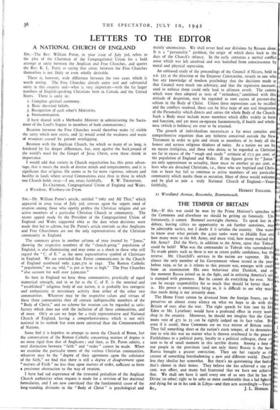A NATIONAL CHURCH OF ENGLAND
LETTERS TO THE EDITOR
SIR,—The Rev. William Paton, in your issue of July 3rd, refers to the plea of the Chairman of the Congregational Union for a bold attempt at unity between the Anglican and Free Churches, and quotes the Rev. K. L. Parry as saying that unior. between the Free Churches themselves is not likely or even wholly desirable.
There is, however, wide difference between the two cases which is worth noting. The Free Churches already enjoy real and substantial unity in this country and—what is very important—with the far larger numbers of English-speaking Christians both in Canada and the United States. There is unity in: a. Complete spiritual autonomy.
2. Basic doctrinal beliefs.
3. Recognition of each other's Ministries.
4. Intercommunion.
(I have shared with a Methodist Minister in administering the Sacra- ment of the Lord's Supper to members of both communions.) Reunion between the Free Churches would therefore make (i) visible the unity which now exists, and (2) would avoid the weakness and waste of resources caused by present overlapping.
Reunion with the Anglican Church, for which so many of us long, is hindered by far deeper differences, but, seen against the background of the world's need for the Gospel of Jesus Christ, even these shrink in importance.
I would add that variety in Church organisation has this great advan- tage, that it meets the needs of diverse minds and temperaments, and it is significant that re'igious life seems to be far more vigorous, tolerant and healthy in lands where several Communions exist than in those in which
one Church holds sway.—I am, yours faithfully, R. W. THOMPSON. Ex-Chairman, Congregational Union of England and Wales. 2 Westdene, Westbury-on-Trym.


























 Previous page
Previous page